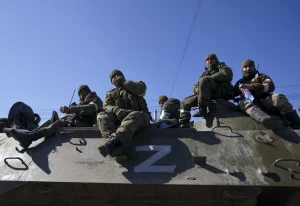
European nations and NATO brace for potential Russian invasion
Amid dwindling U.S. support for Ukraine and the potential candidacy of Donald Trump, European nations and NATO are devising plans to confront Russia independently
The New York Times discussed growing concerns in European nations and NATO about the potential for a Russian invasion in its article.
According to the outlet, concerns are mounting that, with Trump's previous pledges to leave NATO and reluctance to assist allies, European nations might face a Russian invasion without U.S. support, possibly within five years of the Ukraine war’s resolution.
President Putin's ambitions and Russia's recent military activities, including aggression in Georgia and Ukraine, have heightened anxieties among NATO members. European nations worry about the possibility of a Russian invasion, especially as some NATO forces are perceived as unprepared to confront Russia.
“The past few years have also made it very, very clear that NATO as a military alliance, a lot of countries, are not ready to conduct large-scale operations — meaning, in simple human language, a lot of NATO militaries are not ready to fight Russia,” General Palm said in December.
The fear of Putin's imperial ambitions has persisted among states bordering Russia since the dissolution of the Soviet Union in 1991. Despite denials from Moscow, European apprehensions have increased due to Putin's militarization of the Russian economy, substantial spending on the military, and proposed reductions in U.S. aid to Ukraine.
Ukraine's President Zelenskyy has warned that Russian aggression may extend beyond Ukraine, saying “If anyone thinks this is only about Ukraine, they’re fundamentally mistaken. Possible directions and even a timeline of a new Russian aggression beyond Ukraine become more and more obvious.”
NATO insists it is ready to defend its members. However, the rebuilding of NATO's military capabilities, diminished since the Cold War's end, may take years. A NATO military exercise, Steadfast Defender 2024, aims to test readiness, signaling growing concerns among allies about a potential Russian invasion.
“I’m not saying it is going wrong tomorrow, but we have to realize it’s not a given we are in peace,” Adm. Rob Bauer of the Netherlands, the chairman of NATO’s Military Committee, told reporters.
Christopher Skaluba of the Atlantic Council highlights worries that Russia, showing resilience in the face of Ukraine's counteroffensive, may rearm within three to five years. This adds to the urgency for NATO allies to prepare for potential conflicts with Russia.
The potential return of Mr. Trump to the White House has raised concerns among Europeans about a significant reduction in American support for Ukraine and a potential shift in its leadership role in NATO as early as next year, according to Mr. Skaluba. “It’s just this unique mix of factors that is combining to make this long-held fear about Russian reconstitution, or a Russian attack on NATO, become just a little more tense than it has been for the last couple of years,” he said.
Recent developments have heightened worries. “There is a window now that will perhaps last for one, two, maybe three years, where we will have to invest even more in a secure defense,” said Norway’s top military commander, Gen. Eirik Kristoffersen.
Meanwhile, Sweden's military leaders and civil defense minister warned of the need to prepare for war. “Let me say it with the power of office” and “with unadorned clarity: There could be war in Sweden,” Mr. Bohlin, minister for civil defense, said at a security conference.
The statement triggered criticism and accusations of scaremongering. Yet, Sweden, along with Finland, is moving closer to joining NATO, driven by concerns about Russian aggression.
Despite downplaying the recent commotion as "exaggerated," Prime Minister Ulf Kristersson of Sweden underscores Russia as a top threat.
“There is nothing to suggest that the war is at the door now, but it’s clear that the risk of war has increased significantly,” Mr. Kristersson said in an interview with Sveriges Radio.
Estonia's government is acutely aware that the land seized by Russia at the onset of its Ukraine invasion in February 2022, before being pushed back, is roughly equivalent in size to the Baltic States. Colonel Mati Tikerpuu, commander of Estonia’s 2nd Infantry Brigade, stationed near the Russian border, emphasizes Russia's ambition to assert its power. He states that for many Estonians, the question is not whether Russia will attempt an invasion, “It’s only a question of when.”
- News












































